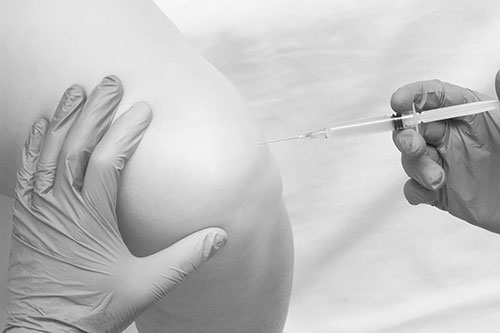- Crushes Blog
- Testimonials
- Contact Us
- To schedule an appointment: 01277 375955
- 501, Ongar Rd, Pilgrims Hatch, Brentwood, Essex, CM15 9JP [See Map]
- E: crushesmanorclinic@gmail.com

Injection Therapy part II
7th July 2020

In the last blog, we mentioned we would discuss the risks and benefits of injections.
Steroids have been in the news a lot lately as there has been a big breakthrough in the treatment against COVID-19, but more on this later.
As discussed before, steroids can be used to help reduce pain in a variety of musculoskeletal (MSK) conditions. When an injury occurs in a body structure, the body reacts in a way so as to cause inflammation to aid healing. Normally, a few days after sustaining an injury, the inflammation dies down and the body moves on to the next stage of healing. But in many cases, the inflammation persists and this gives rise to persistent pain. Inflammation can also happen in the joint or in the soft tissues due to repetitive strain, in conditions such as osteoarthritis and rheumatoid arthritis, or rotator cuff disorder in the shoulder. Steroids help to reduce inflammation surrounding the tissues or inside the joint providing the patient with a window of opportunity to undertake any exercises prescribed by the physiotherapist.
But what does this all mean? Patients will ask us why we don’t just give steroid injections in each and every case. In the first instance, even though inflammation can develop in many MSK conditions, not all chronic conditions will have inflammation; it may have subsided and the healing process may be lying dormant. In these cases, physiotherapy with a loading exercise programme will help if the pain is due to the tendon problem. Only if inflammation persists and the pain does not subside can an injection be considered.
It’s important to note that all medications have side effects. You’ve probably seen information leaflets that come with common medications, such as paracetamol or ibuprofen, which list the various side effects that can develop after taking them.
For steroid injections, the main side effects are:
- Facial flushing
- Altered menstrual cycle in women
- Risk of infection
- Risk of bruising
- Bleeding
- Fat atrophy (In this case, the fat at the site of the injection dissolves due to the effects of the steroid and the area develops a dip which can take a long time to resolve.)
- Depigmentation of the skin (most commonly seen in members of the population who have darker skin)
- Increase in sugar levels
The list is not exhaustive and the clinician should discuss the specific side effects which may occur in an individual along with the more common ones listed above.
We would also avoid steroid injections for people who are:
- Pregnant
- Breastfeeding
- On anti-viral medication (such as for HIV or herpes)
- Patients who are very anxious about the injection
- Patients who are afraid of needles
- Anyone with signs of fever or infection anywhere in the body or who has signs of infection at the area which is to be injected
- Unstable diabetes (a condition where the sugar level is not controlled even after taking the proper medication. This is because the risk of infection is increased.)
To finish, let’s talk about steroids being used to treat patients who are seriously ill with COVID-19. Scientists and researchers have discovered that Dexamethasone, a commonly used steroid given to patients with asthma or rheumatoid arthritis, can help reduce inflammation in the lungs of COVID patients who have difficulty breathing. The medication is only useful when patients need oxygen or are on a ventilator and Dexamethasone was found to reduce mortality in these patients. It was not found to be useful in patients who had mild symptoms of COVID-19, however, and were not hospitalised. Steroids lower immunity, hence there is a small risk of the infection worsening in patients who have only mild symptoms.
I hope the above information is useful. Please feel free to contact us if you have any queries.
